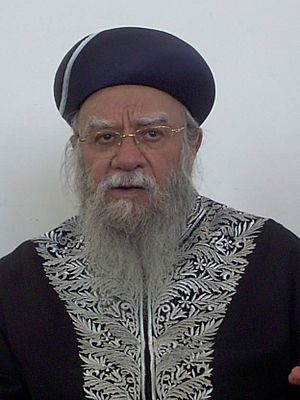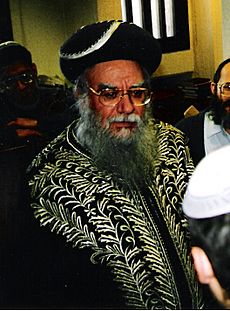Eliyahu Bakshi-Doron facts for kids
Quick facts for kids Rabbi Eliyahu Bakshi-Doron |
|
|---|---|
| אליהו בקשי-דורון | |
 |
|
| Religion | Orthodox Judaism |
| Denomination | Sephardi |
| Personal | |
| Nationality | Israeli |
| Born | 5 April 1941 Jerusalem, Mandatory Palestine |
| Died | 12 April 2020 (aged 79) Jerusalem, Israel |
| Spouse | Esther |
| Senior posting | |
| Period in office | 1993–2003 |
| Predecessor | Mordechai Eliyahu |
| Successor | Shlomo Amar |
| Religious career | |
| Previous post | Sephardi Chief Rabbi of Haifa Sephardi Chief Rabbi of Israel |
Eliyahu Bakshi-Doron (Hebrew: אליהו בקשי דורון; April 5, 1941 – April 12, 2020) was an Israeli rabbi. He served as the Rishon LeZion, which is the title for the Sephardi Chief Rabbi of Israel, from 1993 to 2003. Before this important role, he was the Sephardi Chief Rabbi in the cities of Bat Yam and Haifa.
Rabbi Bakshi-Doron was known for encouraging talks between different religions. He also promoted peaceful ways to solve problems.
Contents
Early Life and Learning
Eliyahu Bakshi-Doron was born in Jerusalem. His father, Ben-Zion Bakshi-Doron, was from Jerusalem, and his mother, Tova, came from Aleppo, Syria. He grew up with two brothers and one sister.
When he was young, Eliyahu studied in several important yeshivas. A yeshiva is a school where Jewish texts are studied. He went to Yeshivat HaDarom, Hebron Yeshiva, and Kol Ya'akov. During these years, he started thinking about becoming a rabbi. He also built relationships with important Jewish law experts like Rabbis Yosef Shalom Eliashiv, Betzalel Zolty, and Ovadia Yosef.
Rabbinic Career
After he got married at age 25, Rabbi Bakshi-Doron was chosen to lead a special group of students at the Porat Yosef Yeshiva. When he was 28, he became the Rav (rabbi) of the Ramat Hanasi neighborhood in Bat Yam. This made him the youngest city rabbi in Israel at that time. Two years later, he was named the Sephardi Chief Rabbi of Bat Yam.
In 1973, at 34, he became the Sephardi Chief Rabbi of Haifa. At the same time, he also led the rabbinical courts in Haifa. These courts made sure that many large food factories in the city followed kosher rules. Kosher means food that is prepared according to Jewish law. During these years, he also gave public shiurim (Torah lectures) to help the Sephardic community grow stronger.
Chief Rabbi of Israel
In 1993, Rabbi Bakshi-Doron became the Rishon LeZion. This means he was the main Sephardi Chief Rabbi of Israel. He was the first person from a non-Iraqi background to hold this position since 1954. He served at the same time as the Ashkenazi Chief Rabbi, Rabbi Yisrael Meir Lau.
In 1998, Rabbi Bakshi-Doron met with Turkish Muslim leader Fethullah Gulen in Istanbul, Turkey. In 2000, Rabbi Bakshi-Doron and Rabbi Lau met with Pope John Paul II. This was an important meeting that helped open the way for future meetings between Jewish and Catholic leaders.
In 2000, while visiting the Jewish community in Singapore, Rabbi Bakshi-Doron said he was open to the idea of giving parts of East Jerusalem to the Palestinians. He believed this could help end the Arab–Israeli conflict. However, he said that the Temple Mount must stay under Israeli control.
Working for Peace
On January 21, 2002, Rabbi Bakshi-Doron took part in a meeting with leaders from different religions in Alexandria, Egypt. They included the former Archbishop of Canterbury, Rabbi Michael Melchior, and Muslim leaders. They all signed an agreement called the First Declaration of Alexandria. In this agreement, they spoke out against the violence happening in the Middle East. Even though leaders like Ariel Sharon and Yasser Arafat supported it, the agreement did not stop the violence right away. Rabbi Bakshi-Doron continued to work with other religious leaders for peace. He was part of the Board of World Religious Leaders for The Elijah Interfaith Institute.
Later Work
In 2004, Rabbi Bakshi-Doron supported the idea of allowing civil marriage in Israel. He felt that the old laws, which made people marry only through their religious authorities, were causing problems and division.
In January 2005, Rabbi Bakshi-Doron attended the first World Congress of Imams and Rabbis for Peace in Brussels, Belgium. About 180 important Jewish and Muslim religious leaders from around the world came together. They released a statement asking for more peace and understanding between Jews and Muslims.
In August 2005, Rabbi Bakshi-Doron, along with other rabbis, spoke out against calls for Israeli soldiers to refuse orders. This was during the time of the Gaza Disengagement, when Jewish settlements were being moved.
Rabbi Bakshi-Doron also had an opinion about women in religious leadership. In 1993, he said that "Women can be of the Gedolim (great leaders) of the generation and serve as halakhic decisors." This means they could help decide on Jewish law. However, in 2015, he clarified that women could not hold official rabbinic positions.
Binyan Av Institutions
After his time as Chief Rabbi of Israel, Rabbi Bakshi-Doron continued to teach and make decisions on Jewish law. He also started the Binyan Av institutions. These include a main campus in the Ramat Shlomo area of Jerusalem.
Personal Life
At age 25, Rabbi Bakshi-Doron married Esther. She was the daughter of Shalom Lopes, who was the Chief Rabbi of Akko. Eliyahu and Esther had ten children together. Esther passed away in 2005.
Rabbi Bakshi-Doron died on April 12, 2020. He passed away at Shaare Zedek Medical Center after getting the COVID-19 virus during the COVID-19 pandemic in Israel. His health was already not strong, which made the virus more serious for him.
Published Works
- Binyan Av, responsa (answers to questions about Jewish law)
See also
 In Spanish: Eliyahu Bakshi-Doron para niños
In Spanish: Eliyahu Bakshi-Doron para niños
- List of Sephardi chief rabbis of the Land of Israel
 | May Edward Chinn |
 | Rebecca Cole |
 | Alexa Canady |
 | Dorothy Lavinia Brown |


